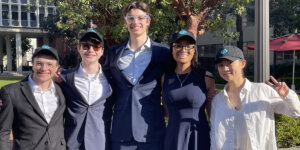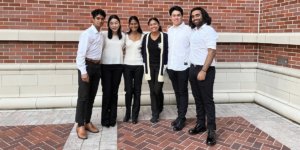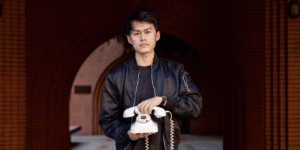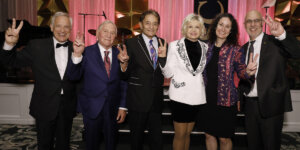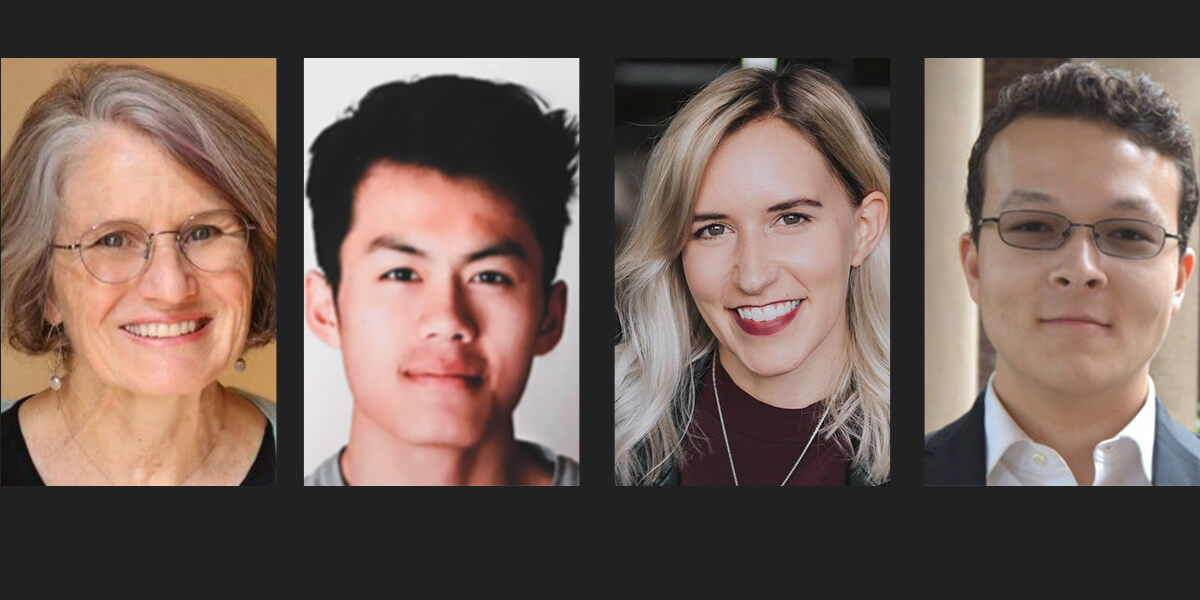
Jill Bauman, Bryan Huang, Brit Moore Gilmore and Anthony Wlencko of Social Benefit won this year’s Min Family Challenge, taking home the $50,000 grand prize (Photo/Madelin Lum)
When Brit Moore Gilmore was brought on as a workforce development consultant at Imagine LA – a social service agency that serves families who have recently exited homelessness, she asked the same question that has long vexed the recipients of government assistance and their case managers: At what point does an increase in income, say from a new job, result in an even larger loss in government support?
Gilmore found that no good tool existed to forecast the so-called benefits cliff. Imagine LA secured a grant and commissioned a team of researchers from the USC Price Center for Social Innovation to identify dozens of available local, state, and federal benefits and how income changes would impact the ability of clients to access them.
That work serves as the basis for Social Benefit, a Los Angeles-based startup developing a digital platform that would leverage algorithms developed by the USC researchers to quickly calculate the emergence of benefits cliffs in myriad scenarios. Gilmore, Jill Bauman, Imagine LA’s president and CEO, and Bryan Huang and Anthony, Wiencko, two USC Viterbi undergraduates, believe their burgeoning firm would appeal to case managers and their clients, and even to policymakers who want to reform the welfare system.
With a few tweaks, Gilmore added, social service agencies in other cities could use the Social Benefit tool.
“The problem we’re trying to solve is not limited to LA and LA County. It’s happening nationally,” Gilmore said. “We see this as something that could be used in different markets where there’s a high-rate of poverty.”
That vision landed Social Benefit the $50,000 grand prize at the 2021 Min Family Challenge, an engineering social entrepreneurship competition that encourages would-be social entrepreneurs to build companies to benefit the underprivileged locally, nationally, and even worldwide. Educational sessions, workshops, and meetings were held virtually throughout the academic year with the finals held remotely on April 15.
USC Viterbi Dean Yannis C. Yortsos said MFC empowers USC Viterbi students and other contest participants to address “wicked problems at the intersection of societal grand challenges and technology.”
MFC launched in October 2015 with a generous gift from Bryan Min, B.S. ISE ’86 and a member of the USC Viterbi Board of Councilors, and his family: his wife Julie Min; their son Brandon, a USC Viterbi graduate in industrial systems engineering; and daughter Brittany, also a USC graduate.
At the challenge, Bryan Min quipped about how his support for MFC could substantially brighten his long-term prospects.
“I go to the Pearly Gates and I can see God asking me, ‘Bryan, what good have you done?’ I think I could point to the Min Family Challenge,” he said half-jokingly. “And maybe God will allow me in at that time.”
The other 2021 MFC finalists included:
Gravity Basin: Affordable, portable, and sustainable wash station designed for water insecure communities that employs a closed-circuit filter to reuse its own water supply
Verteam: A platform to keep track of carbon footprints in real-time and encourages making mindful decisions in daily activities
Frontida Records: Highly customized modular, cloud-based health documentation systems for better patient outcomes and efficiency in low-resource settings
SustainLA: A digital platform that aims to reduce food insecurity and waste by connecting farmers with surplus produce to those in need in Los Angeles
This year’s MFC began in December, with 29 student teams competing for just seven spots. Two groups withdrew along the way, leaving five in the finals. Typically, the contest accepts more teams and winnows them down over a number of rounds.
“We wanted to be more selective this time, so we could be more focused with our time and efforts on the teams, “ said Trina Gregory, MFC program manager. Each of the MFC teams, she added, had at least one USC Viterbi undergraduate or graduate student.
Challenge teams responded to that personal touch.
Gregory said this year’s cohort showed incredible tenacity and commitment, overcoming all challenges posed by COVID-19, including the cancellation of in-person workshops and field trips. To cite but one example of the students’ can-do spirit, she said each team reached out virtually to a minimum of 20 potential customers to learn their likes, wants, and needs. Through this in-depth customer discovery process, Gregory said, participants tweaked business models and prototypes to make them better.
“Our motto at USC is ‘Fight on!’” she said. “In this time of upheaval, where we really have to adjust greatly to our new circumstances, that’s exactly what everyone involved with MFC did: We fought on.”
As with the 2020 MFC, this year’s theme was inspired by the 2030 Agenda for Sustainable Development, a universal call to action to end poverty, protect the planet and improve the lives of people everywhere, said Susan Angus, a member of the challenge steering committee and executive director of the Commission on Voluntary Service & Action, a coordinating council of non-governmental volunteer organizations across the country.
Participants in this year’s challenge attended workshops developed by Innovation Node-Los Angeles that focused on customer acquisition, storytelling, law, and business modeling. The challenge also distributed grant money totaling nearly $3,000 to the finalists, including $1,000 to Gravity Basin to build a prototype, MFC Manager Gregory said.
Cheyenne Gaima, cofounder of SustainLA and a senior majoring in computer science and business administration, said she found the sessions on customer discovery particularly helpful.
“I’ve learned how important it is to talk to anybody and everybody that is actively working or contributing to the field that your venture is trying to innovate in,” she said. “There are so many people who are actively living the problems that we are trying to combat, and their insights are so indispensable.”
Similarly, Lauren Yen, a Frontida Records cofounder and progressive degree candidate who will earn her bachelor’s degree in biology in May and a master’s in global medicine in 2022, said going through the challenge helped her team refine and improve her team’s business model.
“MFC pushes teams like Frontida to rigorously examine the problems that they’re trying to solve,” she said. “As a result, we get to experience the challenge and reward of continuously iterating on designs and strategy until our products fit the real needs of the people we engineer for.”
In recent years, USC Viterbi has become a burgeoning center of innovation and entrepreneurship. With MFC, the Maseeh Entrepreneurship Prize Competition, the NSF I-Corps Node headquartered on campus, and the Viterbi Startup Garage, USC Viterbi students have more opportunities than ever to develop innovative business models and explore commercialization of technologies.
MFC has consistently evolved over the years.
In 2019, the challenge focused on the world’s growing refugee crisis. As part of a special class, CE 499: Engineering Innovation for Global Challenges, students went to Lesvos, Greece, to meet with refugees and devise innovative solutions to meet the needs of people in crisis. In 2018, MFC took USC Viterbi and other students to Texas to meet with Hurricane Harvey survivors. Participants focused on developing sustainable ventures to enhance relief and recovery efforts for victims of that and other natural disasters.
Gilmore, the cofounder of Social Benefit, said going through MFC has made all the difference to her burgeoning business.
“MFC has really accelerated what we’re working on,” she said. “It has equipped us to really understand who our customer is so we could launch our company in the most strategic way possible.”
Published on April 26th, 2021
Last updated on July 21st, 2021




